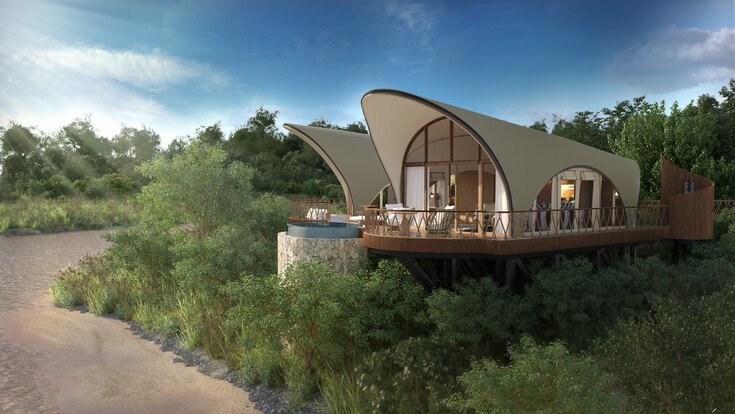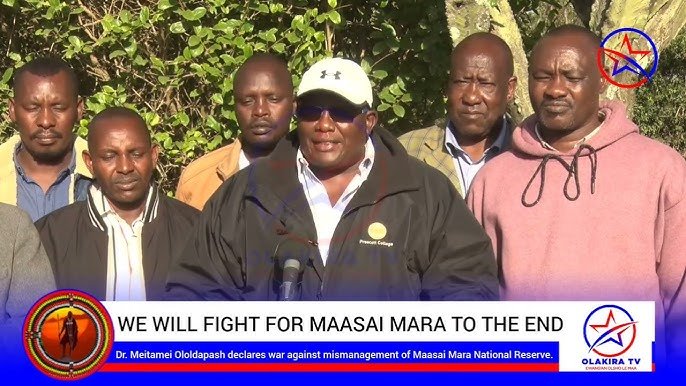A Hotel at What Cost? Defending the Mara’s Migration Route
Luxury on the Migration Route: Protecting People, Place and Wildlife in the Mara
In the heart of the legendary Maasai Mara National Reserve ecosystem, where millions of wildebeest, zebras and antelope traverse ancient paths each year, a controversial chapter in safari tourism is unfolding. The Ritz-Carlton Maasai Mara Safari Camp which opened in August 2025 along the Sand River, boasts a $3,500 per night luxury experience, while provoking environmental concerns (Akinyi). The Sand River is home to a key corridor in the iconic Great Migration where wildebeest cross between Kenya and Tanzania. This river, which is one of the first entry points for the Great Migration, is in imperil with the development of this high-end tourist site. At RIDE International, our values of responsible stewardship, community empowerment, and ecological integrity compel us to ask what this development means for wildlife, Indigenous communities, and the future of sustainable tourism.
Ritz Carlton Safari Lodge
The Threat: Environmental and Cultural Risks Beneath a Sustainable Veneer
The camp is being operated by Lazizi Mara Limited, a Kenyan company, which is in partnership with Marriott International. Lazizi Mara Limited continues to assert that the location of the camp lies outside sensitive crossing zones, and its construction has environmental preservation in mind (Akinyi). The hotel has an unfenced barrier to prevent obstruction of the migration, an elevated deck to preserve soil health, fully solar powered energy, closed loop water recycling, a sustainable waste management, and has been replanted to conserve native vegetation. Alongside this, over 70% of the camp staff are locally employed, and several community initiatives have taken place to support the local community. However, despite these environmental protections and grassroots movements, questions of legality, authority, and the overall justification for this high-risk infrastructure still remain .
Conservationists warn that even minimal infrastructure could divert herds and fragment fragile ecosystems (Ross). Wildebeest, zebras, and gazelles could be forced onto longer, riskier paths with limited water and higher predation, threatening the balance of the entire Mara–Serengeti ecosystem (Akinyi). Predators would lose crucial prey, grasslands would degrade without natural grazing, and biodiversity would decline.
For local Maasai communities, such disruption endangers both livelihoods and cultural ties to the land. These communities, who have safeguarded these lands for generations, say they were excluded from meaningful consultation and stand to bear the ecological and cultural costs (Ross). Protecting open corridors is therefore essential to sustaining wildlife, community wellbeing, and the ecological integrity that defines the Maasai Mara. For RIDE International, responsible development demands both ecological integrity and community empowerment — ensuring tourism uplifts local livelihoods while protecting the natural heritage on which it depends.
Protests from Local Conservationist Reveal the Underlying Environmental Threats
Leading the battle against the Ritz-Carlton camp is Meitamei Olol Dapash and Maasai Education, Research, and Conservation Institute (MERC). Dapash is a Kenyan conservationist advocating for the traditions of the Great Migration to not be disrupted by luxury tourism. He dismisses the minimal environmental and community efforts by The Lazizi Mara Limited franchise as a “distraction” meant to direct attention away from the truly alarming economic peril the camp is setting into motion (Akinyi). Spearheading with his organization MERC, Dapash filed a case against Ritz-Carlton, Marriot, Lazizi Mara Limited, and Kenyan authorities in an attempt to block the opening of the camp (Ross). The grounds for his lawsuit surround the obstruction of the crucial migration corridor, the violation of a management plan for Maasai Mara, and the lack of evidence an environmental impact assessment was conducted for the camp. Dapash’s lawyers have employed the Environment and Land Court in Narok to halt the lodges opening and hear the case on a priority basis, however, the court deferred the order and instead, a full hearing has been set for October 22, 2025 (Ross).
Providing scientific data of the crossing of wildebeest through the corridor, Dapash continues his ongoing confrontation against the existence of the camp. The bypassing of a Narok County plan for "no new tourism accommodation developments" before 2032,” lack of evidence for a legally required environmental impact assessments, and negligence for the critical migration corridor have caused Dapash to demand transparency regarding land leases, environmental permits from NEMA, and community consultation (Akinyi). Dapash’s work embodies the principles RIDE International stands for — community-led conservation and environmental accountability.
Providing scientific data of the crossing of wildebeest through the corridor, Dapash continues his ongoing confrontation against the existence of the camp. The bypassing of a Narok County plan for "no new tourism accommodation developments" before 2032,” lack of evidence for a legally required environmental impact assessments, and negligence for the critical migration corridor have caused Dapash to demand transparency regarding land leases, environmental permits from NEMA, and community consultation (Akinyi). Dapash’s work embodies the principles RIDE International stands for — community-led conservation and environmental accountability.
Want to find out more? Visit MERC’s website:
https://www.maasaierc.org/work/decolonizing-knowledge-education
Why It Matters: At the Crossroads of Conservation and Commerce
Sacrificing nature's instinctive migration processes for expensive tourism, the Ritz-Carlton camp poses distressing perils to the sensitive environment of Maasai Mara.
At RIDE International, our mission emphasizes three pillars: People, Place, and Planet.
People: We champion participatory development, meaning local people aren’t passive beneficiaries but active decision-makers. With this camp’s controversy, we see the need for genuine dialogue, fair benefit-sharing and respect for Indigenous custodianship (Akinyi; Ross).
Place: The Maasai Mara is more than a backdrop; it’s a living landscape of interaction between wildlife, communities and ecosystem processes. Protecting that place means ensuring migration corridors remain open, culture remains vibrant, and the territory remains viable for future generations.
Planet: In the era of climate change, biodiversity loss and ecosystem disruption, tourism that undermines migration routes is a red flag. RIDE sees tourism not as extraction but as a partnership with nature — ensuring we leave places better than we found them.
A Call for Balance and Integrity: What YOU Can do
Together, we can enact change.
The story of the Mara is still unfolding.
Stay informed by following advocates like Meitamei Olol Dapash and MERC, and share verified updates that center Indigenous voices and ecological integrity.
By spreading this story, readers help strengthen global pressure against developments that threaten our planet’s most vital landscapes.
Awareness fuels accountability.
Want to find out more? Visit MERC’s website:
https://www.maasaierc.org/work/decolonizing-knowledge-education
References
Akinyi, Hellen. “Court to Weigh Ritz-Carlton Mara Dispute.” Tourism Update, 17 Sept. 2025, https://www.tourismupdate.com/article/court-to-weigh-ritz-carlton-mara-dispute.
Ross, Aaron. “Kenyan Activist Tries to Block New Ritz-Carlton Safari Lodge Opening.” Reuters, 12 Aug. 2025, https://www.reuters.com/business/environment/kenyan-activist-tries-block-new-ritz-carlton-safari-lodge-opening-2025-08-12/





